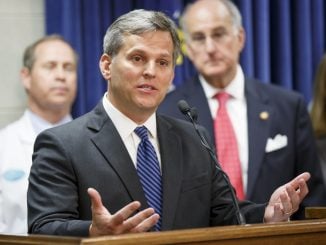
RALEIGH — North Carolina Gov. Josh Stein released his budget proposal on March 19 containing roughly $68 billion in spending over the biennium.
“My budget ensures that we will be able to continue investing in our people, meeting their needs and keeping North Carolina strong,” Stein told media outlets.
The governor’s budget proposes $33.65 billion for FY 2025-26 and $34.35 billion in FY 2026-27. His predecessor’s final budget of his term for FY 2024-25 was more than $34.5 billion, roughly the same as Stein’s year one proposal.
Stein’s budget has several main focus areas, including spending on education, public safety, workforce development, and freezing personal and corporate tax rates at current levels. Funding for Hurricane Helene relief is absent from the budget, with the governor saying that issue will be in a separate request.
State employees would see a 2% raise, and retirees would get a 2% cost-of-living bonus. Additionally, a $1,000 bonus for most state employees would be paid in October to those employed by Sept. 30.
Education has the most spending items, totaling nearly $2.1 billion.
It would include a 10.6% teacher pay raise over the two years, costing more than $1.047 billion. Stein said the increase would raise the average salary to $53,000 by 2027, making the state’s teachers the highest paid in the Southeast.
Principals would get a 6% bump, noncertified and office staff a 3% increase, and all Department of Public Instruction (DPI) would see a 2% increase. There would be one-time $1,000 bonuses for principals, noncertified and central office staff, and all DPI employees.
Other Education items include:
- Restoration of master’s pay
- $5.1 million for a pilot limiting cell phones in the classroom
- $170.6 million overall across the biennium for free breakfast for all K-12 students
- $222.6 million to replace/issue student laptops as COVID relief funds used by districts are now gone
- $4 billion school bond referendum for school construction and facility needs
To fund some of his increases, Stein’s proposal calls for a moratorium on the Opportunity Scholarship program (OSP) as well as ending any new applications and cutting the funding.
The OSP provides income-based grants for students to attend the private school of their choice. Almost 80,000 students utilize the program, and more than 40,000 applications were received during this year’s early priority period, which ended in early March.
House Speaker Destin Hall (R-Granite Falls) said he wants to raise teacher pay but called Stein’s proposal to end the private school scholarships “a nonstarter with us,” according to The Associated Press.
Stein’s budget “rips educational freedom and parental choice from hardworking families,” Lauren Horsch, spokesperson for Senate Leader Phil Berger, told The Associated Press.
Just under the fiscal line item for the OSP, Stein also calls for increasing “need based” funding for students to attend private colleges.
Stein’s budget would give the State Health Plan, which state Treasurer Brad Briner projected will have a $507 million deficit in 2026, an additional $450 million in FY 2025-26 over the biennium.
The retirement and pension system, however, didn’t have funding levels desired by Briner.
“We are disappointed the Governor is proposing for only the second time in 83 years to not fully fund our state’s retirement system,” Briner said.
Briner also said the proposal sent to lawmakers “would create a $206 million shortfall in the funds for our retirees over the next two years.”
Citing potential future budget shortfalls and to support the potential spending, Stein’s proposal calls for lawmakers to stop the next round of tax rate reductions. The current individual income tax rate of 4.25% will drop to 3.49% in 2026-27, and the corporate income tax rate of 2.25% will drop to zero after 2029. The tax reductions enacted by Republicans already have triggers that would maintain or alter the rate depending on economic conditions.
Stein also offers a series of tax credits in his proposal.
Stein called for the adoption of a “Working Families Tax Credit” and a “Child and Dependent Care Tax Credit.” The governor also proposed converting the state’s child deduction to a refundable child tax credit and reestablishing the “back-to-school” sales tax holiday on school supplies. These four items would reduce revenues by over $265 million over the next two years.
Stein also seems to be proposing his own version of the Trump administration’s Department of Government Efficiency, commonly called DOGE, by establishing the “IMPACT Center,” which stands for Innovation and Modernization for Performance, Accountability, and Cost-Effective Transformation.
IMPACT will be administered by the Office of State Budget and Management, but Stein doesn’t say how it will be funded other than to mention “targeted investments of $91 million” to evaluate programs, policies and outcomes, and to “efficiently manage state resources and identify waste, fraud, and abuse.”
Also in Stein’s proposed budget:
- $280M in “unemployment benefit enhancements” over the biennium to address the state’s average weekly benefit of $302, which ranks 42nd nationally, and the maximum weekly amount of $350, both of which Stien notes have “remained unchanged since 2013.”
- $138.2 million in FY 2025-26 and $117.7 million in FY 2026-27 to build a talented workforce and create pathways leading to high-demand, high-wage jobs.
- More than $630 million and $660 million in child care and early education in each year of the next biennium, respectively.
- $194.1 million in FY 2025-26 and $209.6 million in FY 2026-27 for school resources officers, school security, correctional officer pay and combat the fentanyl and opioid crisis.



